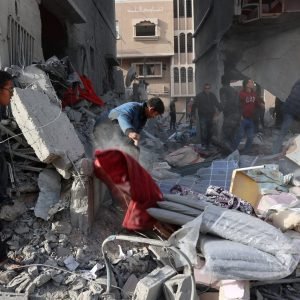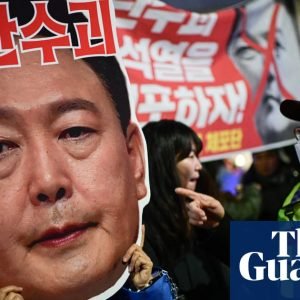
THE PHILIPPINES will promote a rules-based order amid intrusions into its exclusive economic zone (EEZ) in the South China Sea during the summit of Southeast Asian leaders in Laos this week, its leader said on Tuesday just as China fired water cannons at Philippine fishery bureau ships.
President Ferdinand R. Marcos, Jr. said his country continues to grapple with the “sharpening regional tensions,” citing “recent dangerous incidents” within the Philippine EEZ.
“I intend to champion our advocacies in promoting an open, inclusive, and rules-based international order, he said in a speech before flying to Laos for the 44th and 45th summits of the Association of Southeast Nations (ASEAN).
Manila would continue to push for the “peaceful resolution of any disputes in accordance with international law,” he added.
Before flying to Laos, the Philippine Navy confirmed reports that Chinese vessels fired water cannons at two ships of the Bureau of Fisheries and Aquatic Resources (BFAR) delivering supplies for Filipino fishermen in Scarborough Shoal, which Manila calls Bajo de Masinloc.
“The CCG vessels attempted to impede the mission of the BFAR vessels but were unsuccessful,” BFAR said in a statement.
They “opened and directed their water cannons, but this failed to reach the Philippine civilian boats,” the agency added.
“Notwithstanding the dangerous maneuvers and opening of water cannons, both BFAR vessels were able to resupply the Filipino fisherfolk in the vicinity of Bajo de Masinloc.”
A 2016 arbitral ruling that invalidated China’s expansive claims in the South China Sea said the shoal is a traditional fishing ground for Filipino, Chinese, and Vietnamese fishermen. China has effectively controlled the shoal since 2012.
BFAR said its vessels were able to supply Filipino mother boats and 16 small fishing boats.
The Philippine agency said it will not be deterred from patrolling all Philippine maritime zones and providing support to Filipino fisherfolk “pursuant to its mandate of enforcing all laws and rules and regulations in the management and conservation of fishery resources.”
SUMMIT AGENDA
Aside from the South China Sea disputes, Mr. Marcos said ASEAN leaders were also expected to put focus on the situation in junta-led Myanmar, Russia’s war in Ukraine, and conflicts in the Middle East.
He said the Philippine government was working for the safety — and repatriation — of over 40,000 Filipinos in Lebanon and in Israel.
His government has recently taken a clearer stance on the conflict in Gaza, one of the two territories occupied by Palestinians — the other being the West Bank — that the Israeli government has been trying to invade for years.
Last month, the Philippines joined 123 other countries in favoring a United Nations resolution urging Israel to end its occupation of Palestinian territories within a year.
Tensions in the Middle East continue to escalate following Israel’s bombardment of Gaza in response to missile attacks by the militant group Hamas on Oct. 7 last year.
Israel launched a ground operation into southern Lebanon last week, as it vowed to conduct raids against “Hezbollah terror targets” that it said were “immediate threat” to northern Israeli communities.
“I am glad to report that no Filipino has been reported injured in the crisis that we hear about in the news,” Mr. Marcos said, referring to the “wave of attacks against Hezbollah targets in the past few days, and the consequent Iranian reprisal against Israel.”
The tension is the latest in a spate of cross-border hostilities following Israel’s bombardment of Gaza.
“The Philippines urges all parties to refrain from escalating the violence and to work towards a peaceful resolution of the conflict,” said Mr. Marcos, whose country eyes a nonpermanent seat at the UN Security Council.
He said Philippine embassies have been working on securing exit papers and transportation for Filipinos who want to return to their country.
“Of the 1,500 initial applicants for repatriation from Lebanon, a third have already gone home, while another third, around 500, are still having their papers processed,” he said.
The Philippine foreign affairs “will expedite” the repatriation process, he added. The migrant workers department “will be chartering the flights to bring them home.”
For this month, the two agencies target to repatriate at least 162 overseas Filipino workers from Israel, Mr. Marcos noted.
At the weekend, Foreign Affairs Undersecretary Eduardo Jose A. de Vega said more than 100 Filipinos were set to be repatriated from Lebanon in batches from Oct. 11 to 28 amid Israeli bombardments.
The list includes 15 Filipinos whose repatriation scheduled for Sept. 26 did not push through due to postponement of commercial flights.
The agency earlier said the Philippines was having a hard time securing landing rights for chartered flights.
Meanwhile, Mr. Marcos said he will be participating in meetings with ASEAN’s external partners, to “advance cooperation” in areas such as food and energy security, trade and investment, supply chain resilience, and the climate agenda.
The Philippine leader has increasingly pushed for the integration of his country into the regional and global stages, pursuing multilateral economic and security deals including the ASEAN-dominated Regional Comprehensive Economic Partnership (RCEP).
A day before flying to Laos, Mr. Marcos met with South Korean President Yoon Suk Yeol at the presidential palace in Manila as the latter held a two-day Philippine visit, the first leg of his three-nation Southeast Asian trip. He also attended a forum organized by Philippine and Korean businesses later in the day, touting some of the liberal economic reforms in the country including Singapore-inspired law that significantly cut corporate income tax. His administration pushes for the revision of the bill to further lower the CIT and simplify the process for tax deductions. — Kyle Aristophere T. Atienza





